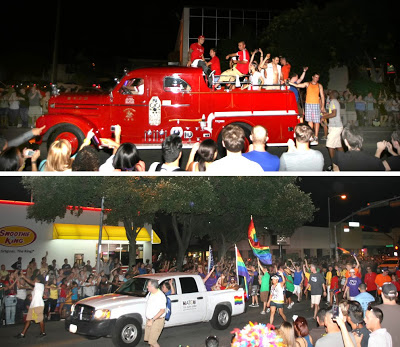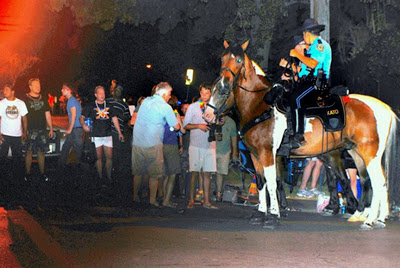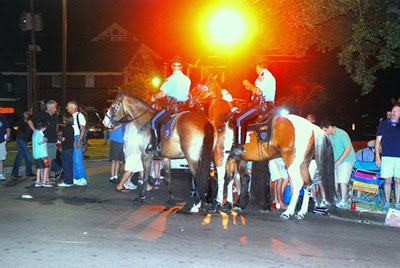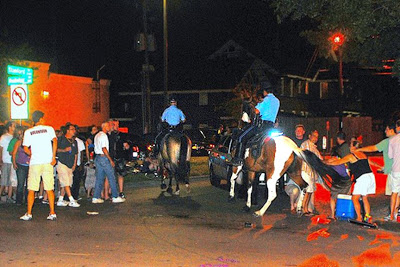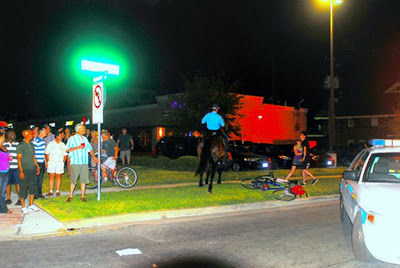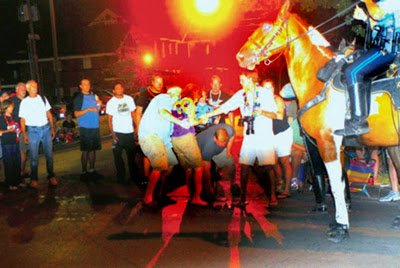(And the cops manage to hold their horses)
Massive pride parade in the Montrose
By Bill Maxey / The Rag Blog / June 30, 2010
HOUSTON — Every June for the past three decades Houston has put on a boisterous street party that starts with a daytime festival of performers and artists and ends in a nighttime parade of floats and marchers, celebrities and politicians.
The all-day event sponsored by the city’s well organized gay and lesbian community draws tens of thousands of Houstonians to the historic Montrose district, where my wife Kirste and I live, and testifies to the city’s reputation as a cosmopolitan oasis in a state better known for its red-necked cowboys, Lone Star beer, and Saturday-night lounge shootings.
Last weekend’s Pride Parade, like the 30 before it, was a noisy, high-spirited but peaceful procession that wound its way past the Mexican restaurants, small antique shops, and neon tattoo parlors on Westheimer, the major east-west artery that slices through Montrose. Some crowd estimates were well over 150,000. But unlike last year’s parade, clumps of two, four, five police officers stood watch on the crowd at nearly every intersection, the red lights atop their squad cars pulsating.
More barricades than last year’s number were set up by the city, the better to gently control the crowd of onlookers. And members of the Houston Police Department’s Mounted Patrol — whose 1,200-pound gelding Kato trampled Kirste at last year’s parade, were barely seen this year.
Kirste and I own a 1920s bungalow in Montrose, recently honored as one of the country’s 10 great neighborhoods. We count Annise Parker, Houston’s mayor, as a neighbor, and in previous times the late Walter Cronkite and Howard Hughes lived nearby.
So last year, we hopped on our bikes and pedaled over to Stanford street where we met our neighbors, a group of single and married couples, some with children and others without. It was to be a night of fun.
The 2009 parade began, heading east on Westheimer, and we cheered as it passed us, the crowd numbering an estimated 80,000 people. Few officers on foot were present. There were no barricades on that section of Westheimer. Kirste was busy snapping photos with her iPhone, but she soon discovered that headlights on the floats caused glare and her pictures looked better if she faced towards the east, away from the marchers. And then it happened.
A trio of Houston police officers on horseback approached from the west. Led by Officer P. Hernandez riding his mount Kato, they turned into the onlookers assembled along Westheimer and used their animals to force back the surprised spectators, many of whom were cheering as loud music blared from the floats. The police officers did not use any whistles or other sound-making devices for crowd control. So, the people were immediately confronted with two choices: either step back or be trampled. And my dear wife, facing the opposite direction, never saw what hit her.
The next day, June 28, 2009, a Houston Chronicle article reported: “Police say the officers, and the horses, were just doing their jobs. ‘The woman wasn’t kicked, stepped on or trampled,’ HPD spokeswoman Jodi Silva said.” Despite what Silva told the reporter, however, several dozen witnesses watched in horror as Kirste was repeatedly kicked and stomped by the skittish, out-of-control Kato. During the subsequent police internal affairs probe, an investigator told me that an officer on foot said she saw the horse strike Kirste in the back of her head and knock her to the ground.
An ambulance took Kirste to the emergency room that night. She suffered deep bruising on her arms, legs, and torso. Her forehead was swollen with knots the size of tennis balls as was the back of her head. And she had a hole from a deep cut to her chin that went through into her mouth.
But she survived the assault — and for that I am thankful. And so here we are, nearly a year later, her bruises have healed and dozens of dentist visits are behind her. She still has temporary teeth, and faces multiple years of orthodontic work ahead of her, as well as reconstructive surgery to her chin.
See more pictures of the incident, Below.
After the shock wore off, important questions remained unanswered. HPD has never explained, for instance, why the Mounted Patrol decided it was necessary to turn their horses into the peaceful crowd. Or why at first, until multiple witnesses came forward, did the police department’s public affairs office release statements to the media that the trampling never even occurred. Other questions remain unanswered by Houston officials, among them:
- Why did no police officer offer to render first-aid to my wife, despite the fact that all HPD officers are given first-aid training? A Good Samaritan helped me pick Kirste up and carry her safely away from the agitated Mounted Patrol’s horses. Eventually the ranking officer on the scene, Lt. Randall Wallace, dismounted and watched as civilians attempted to stop the bleeding.
- Did HPD last year use different procedures for the Pride parade than it used for other parades?
- Why has the HPD refused to inform Kirste and me of the results of its internal affairs investigation?
Houston surely is no stranger to parades, but perhaps our city could look to the manner in which nighttime parades are managed in New Orleans, where they have been a way of life since the 1830s. Crowd control there is managed by a large police presence, primarily on foot. Yet Lt. Wallace was quoted in the Chronicle as saying that about 20 officers were scheduled to patrol last year’s Pride Parade on foot that night but they “didn’t make it.” Why not? Did the shortage of officers cause the mounted patrol to become overly aggressive?
So, in the aftermath of this year’s Pride Parade, another question arises: Did the HPD and Houston city government make any changes in parade planning or security procedures?
A couple days before the parade, Mayor Parker, who rode in the city’s first Pride Parade in 1979, made it clear to me that she had turned down my request to replace the Mounted Patrol with the department’s Bicycle Patrol at the parade. Then she said:
Mr. Maxey, I personally observed the actions of the Mounted Patrol at last year’s Pride parade, (and) don’t think they were in the best interests of public safety and crowd control purposes at all times. They will be at this parade, but I hope that they will return to the professional behavior that has made them a benefit to the parade in previous years.
I must ask, would this behavior be acceptable if a small child had been trampled by a police mount at the annual Thanksgiving Day Parade?
My wife and I are both native Houstonians, and we love our city. We are fortunate to have health insurance which paid for the initial emergency room charges, and the means to pay out of pocket for the dental work. The financial costs have been considerable, and the bills will continue to amass in the months ahead. But it’s not always about the money; sometimes it’s about making sure that our public servants are doing the right thing.
Kirste feels strongly that she needs to speak out and that the HPD still needs to implement better parade policies and procedures. I agree. She and I have appeared before the Houston City Council to tell her story and ask for changes in police procedure.
As the recently concluded Pride Parade rolled past me last Saturday night, I recalled her request that the City of Houston erect more crowd barricades. It did add another block of barricades. But the line of barriers stopped 10 feet from where Kirste was attacked by Kato last year.
And the horses of the Mounted Patrol were quartered on the side street behind me; their role this year reduced to that of spectators.
[Bill Maxey and his wife, Kirste Reimers, are native Houstonians who own a 1920-era bungalow in the near-downtown Montrose district, where the annual Pride Parade takes place. Maxey owns an electronic systems integration firm, and can be reached at bmaxey2005@yahoo.com.]
The Rag Blog

